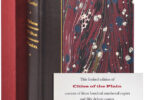Don’t throw those Yellow Pages away quite yet!

The Cleveland Directory Co.’s Lakewood (Cuyahoga County) City Directory Including Bay Village, Fairview Park and Rocky River – listed by Books of Aurora, Inc.
City directories are an interesting niche where the world of collectible books and ephemera meet. While they aren’t the most riveting object to collect, city directories deserve a place on the shelf of a some collectors.
For example, if your book collection based on your hometown, a city directory can be a great addition! Famous businesses, family names, and other facts about the town are beautifully bound in a directory.
These annual compilations are also a great tool for researching history or genealogy. If you’re writing a story set in 1954, a city directory from that year can provide inspiration on names of locals, businesses, and other details about a town that can’t easily be found elsewhere!
In current news, Warsaw is using a previously-unpublished phone directory from 1939 to help survivors of the Holocaust find their ancestors and in some cases, collect restitution payments for possessions and properties claimed by the Nazi regime.
So, maybe the Yellow Pages in its little bag that was carelessly tossed on your driveway isn’t worth much now, but an author in the future just might find it useful.
More Resources:
- Biblio Book Collecting Guide: Collectible City Directories & Gallery: “City directories are not just important for individual collectors but are a must for local historical societies, museums, libraries and archives. They contain information unobtainable or difficult to obtain elsewhere. Some of the above institutions understand the value of these directories and try to purchase as many of them as they can. There is added value in having the ability to examine a run of these books, rather than a single year in isolation. You can track the growth of a community or its decline. You can track ancestors or people you are researching for historical purposes over the entire time they lived in a particular city. You can see their work history, when they changed residences, whether they owned a house or rented, who lived with them and when they moved from the city.” – author Dan Weaver
Amber is the marketing coordinator at Biblio. A lifelong love of the written word brought her to Biblio and she happily spends her days talking about books and delving into the wide world of antiquarian books.







I have an original 1885-6 Quincy, Illinois City Directory I would like to sell.